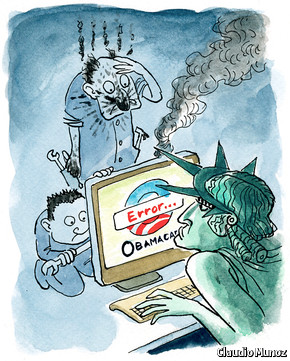
JASON LAHOZ is a parking attendant in Philadelphia with two small children. He is also one of nearly 50m Americans without health insurance. He hopes to change that. He recently visited the “Independence Express” bus; Independence Blue Cross, a local insurer, is promoting coverage under Obamacare. Mr Lahoz was told he would qualify for public subsidies to buy insurance. “That would be perfect,” he said, “if that’s actually true.”
He could not find out, however. Like millions of Americans who tried to use healthcare.gov, the new Obamacare website, in its first week of operation, he found that it was not working. The helpful people on the Blue Cross bus could not help him. “They say that when the site starts working, they’ll call me back,” he sighed.
Since October 1st, when Obamacare’s health-insurance exchanges were launched, they have been plagued by glitches. The federal government, which is operating an exchange on behalf of 36 states, has seen some of the worst problems. Officials say that too many people tried to log on at once; within three days, 8.6m had visited healthcare.gov. But having trumpeted health reform for years, Mr Obama’s team should hardly be surprised that Americans decided to check it out.
The glitches may be short-lived. Officials and contractors are rushing to fix them. New York’s exchange seems to have recovered. In one week it quadrupled the capacity of its computer servers, and as of October 8th more than 40,000 New Yorkers had signed up for coverage. But other exchanges are making slower progress. Shoppers at healthcare.gov are tweeting their frustration. @Ginnyproffitt opined: “So now I can’t even log in…Wth!!! This site will be the death of me!!” The health department has yet to report how many people have managed to enroll in the federal exchanges.
All this is unfortunate. Obamacare’s main goal is to expand access to cheap insurance. It offers subsidies to those who cannot afford it and bars insurers from charging people more because they are sick. The sick who lack insurance will probably keep trying to enroll. The young and healthy may give up more quickly, if it is too difficult. And if they do, the insurance firms that offer policies via the exchanges will find that their pool of customers is disproportionately sick and costly to cover. This may spur them to raise prices for everyone, making the young and healthy even less likely to enroll, despite the small fines they would have to pay if they lack insurance. A death spiral could follow.
The success of Obamacare depends on getting lots of people to sign up. So nonprofit groups, insurers and some states are energetically promoting the exchanges. Enroll America, a group run by a former White House employee, is mining data to find the uninsured, then going door to door to urge them to buy coverage. Oregon has ads with folksy insurance songs, surely a new genre (“To care for each one, every daughter and son, live long Oregon”). But such efforts will be wasted unless the software gremlins are fixed.
0 comments:
Post a Comment